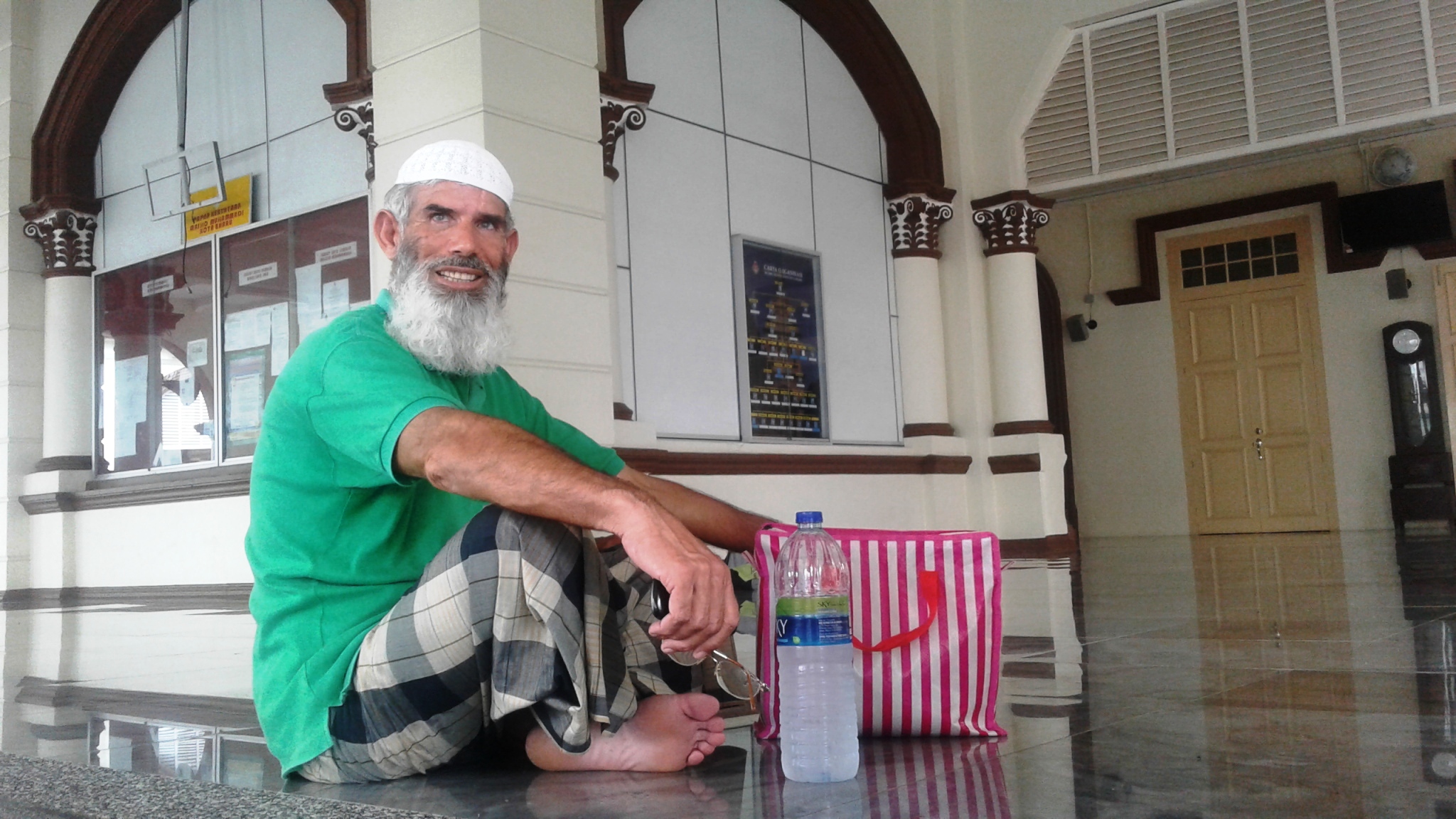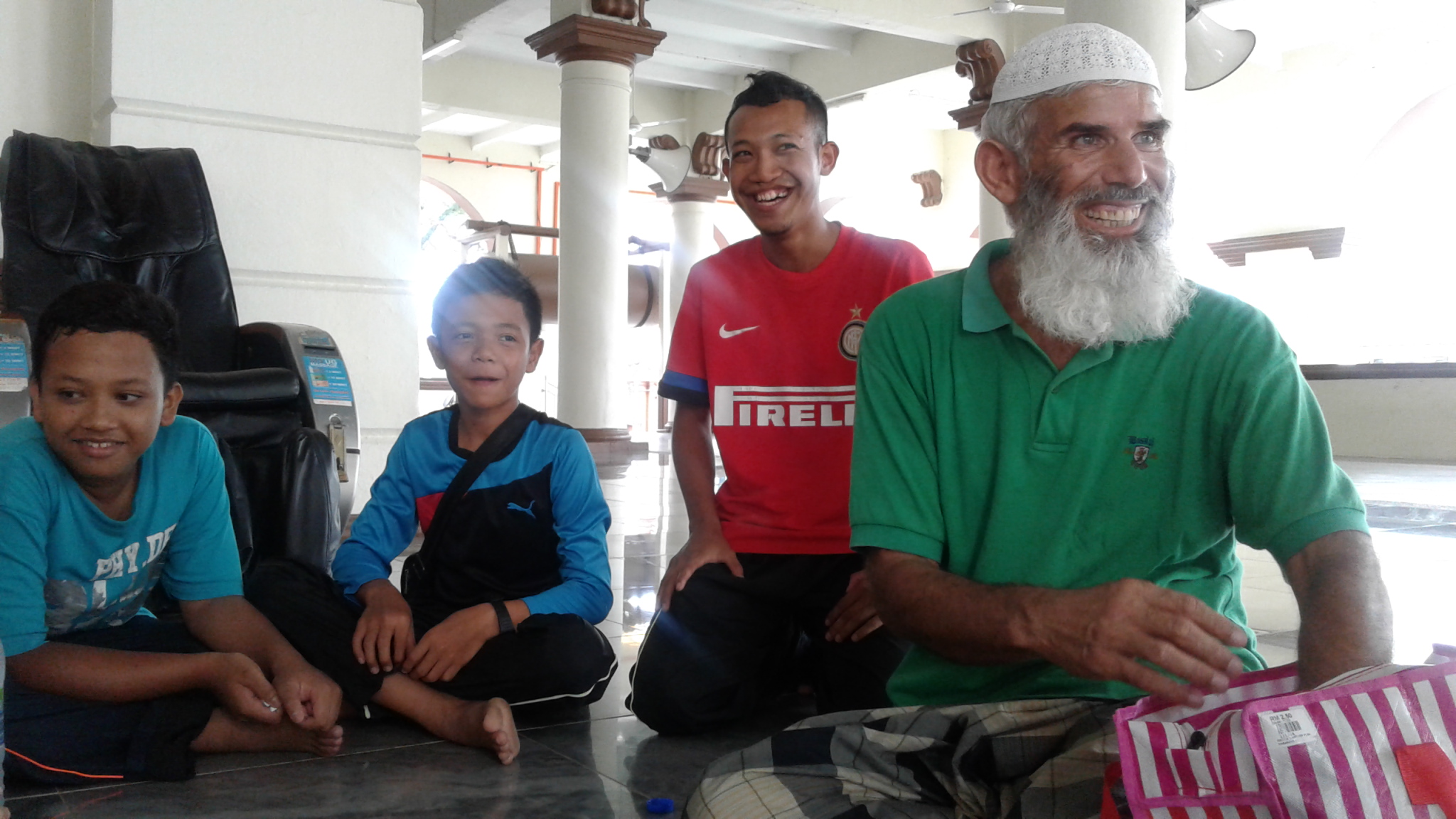A Traveling Mystic in Kelantan

MUHAMMED NOUSHAD meets a Pakistani mystic refugee at a mosque in Kotabharu, Malaysia.
From very far, you could make it out that he is an aged Pathan. Clad in a green T-shirt and lunki, he wore a white skull cap. His smile spoke of the painful burdens his soul has managed to traverse through, and absorb, in a graceful way, thanks to the profound spiritual masters he has lived with. He could only be a traveling mystic; perhaps a Sufi. But what is a Pakistani fakir doing at this state mosque in small town Kotabharu, in Kelantan, the most traditional region of Malaysia? Sufis and darwishes could do anything; they could be anywhere – I had already known it. He was entertaining a small group of Malay school boys, making fun of them in broken English and distributing the candies he carried in his small plastic bag. I smiled at him and he returned his generous smile and offered three candies. When I politely refused to take it, he insisted saying, ”kisi bache ko dena” (give it to some kids). Accepting them, I took permission to sit in the small circle. Then two boys came running with a mineral water bottle; he received the bottle and the balance amount, thanked them, drank water and passed the bottle to the boys in the circle.
With my friend Dr. Noushad, I listened to him, sitting in the circle which slowly dwindled as the kids left us – saying salam, shaking our hands and kissing on each one’s palms, a sign of deep respect – as their teachers were waiting for them outside, near the market. This man who drew our attention was 61 years old and his name was Mehmood Ahmed. He reached Malaysia one and half months before, from Pakistan, and holds a UNHCR card, which he believes would enable him to get the visa extended for a year, at least. He is ready for any job that would fit to his physical conditions, but hasn’t found any. He spends most of his time in mosques – mostly in semi-urban or rural Malaysia. He is happy that Malaysians are a hospitable people and nowhere they have prevented him from sleeping in the outer halls of mosques.
Born and brought up in Renala Khurd in the Punjab province of Pakistan, he married from the same locality and raised three children – one daughter and two sons. Mehmood worked in the pesticide industry back in his home town. His life was unexpectedly thrown into total disarray in 1998, when a multinational company, whose name and details he is unaware of, took over the land and property he had had. One more among the multitude of development victims in the third world. Mehmood had to look for another place and job to sustain his family. He managed to fly to Dubai and found himself wandering from door to door, begging for mundane jobs across the merciless hubs of capitalism. He stayed with his friends for quite some time, and finally, when he got a packaging job at a warehouse, he realized that the job timings wouldn’t allow him to pray his mandatory namaz. He left the job the first day itself and decided to return to his homeland. Back in Pakistan, he moved to Karachi and spent two years there, doing odd jobs.
In the middle of our conversation, at some point, Mehmood doubted if I worked for the Malaysian police department, gathering information about refugees. I took notes, asked for details, often – that was unnecessary for an ordinary casual conversation. When I said my inquisitiveness might result in a brief write-up about him, he was convinced. “Do you mind if I write about you and your life”, I asked. He smiled, “khub likho; acha, mere pardada pir murshid ke bare mei zarur likhna..” (Write as you wish – but, please do write about my Pardada Pir Murshid). I nodded.

Mehmood interacting with Malay school boys
That was the real story that he wanted me to write. Mehmood mia belongs to the Naqshabandiyah Mujaddidiyah order of Sufism. In the sophisticated hierarchy of spiritual mentoring, which has a particular way of practising in certain tariqas and traditional Sufi orders in South Asia, he has three pious masters in ascending order of importance and veneration. His immediate spiritual mentor, with whom he is supposed to consult regularly, is Peer Muhammad Minhajul Islam – his Peer Murshid. Above him comes his Dada Peer Murshid, whose name is Khaja Abdul Salam. And Khaja Abdul Samad is his Pardada Peer Murshid, the greatest of them all. Whatever he has accomplished in this life, Mehmood is doubtless, is because of the compassion his Sheikhs have shown and taught him. An old man with a refugee status in a far away country boasting about what he earned in life – sounding ridiculous? Wait; he is talking about spiritual wealth, the deeper richness. “I talk to my masters every day”, he told me, “they talk to me, console me, guide me, lead me, pray for me – that is how I am here”. Obviously he didn’t mean talking over phone. A refugee living on the alms given by good Samaritans can’t afford it. Even at affordable rates, who would be able to talk to a dead person? Mehmood says that his masters are responsible even for the temporary UN card he holds. Each time he mentions them, he praises Allah for giving such benevolent masters.
When he knew that I am from India and would soon return home, he told something that touched me deeply. His Pardada Peer Murshid, the great grand spiritual mentor, had left for India in his late years and died in Ambala, Haryana. He requested me, “in case you visit Ambala in future, please go to my Sheikh and pray at his grave”. I could see his teary eyes. I kept silent for a while and asked him, what I should pray over there. “Just make your prayer. Pray for him, pray for me, pray for you, pray for everyone…” he replied. I hugged him deeply and went away.